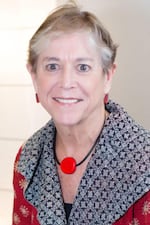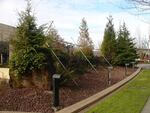
During Damrosch's tenure, Portland has branched into many new arts ventures, including the Right Brain Intiative (a program incorporating arts in public school classrooms).
Courtesy of the Regional Arts and Culture Council
In the 17 years that Eloise Damrosch was at the helm of the Regional Arts and Culture Council, she had a 10,000-foot view of the seismic changes in the city’s arts scene. She retired in 2017, and the search to replace her has stretched through eight months. It’s clear that the tasks ahead for her successors will be heavy lifts.
Damrosch joined us this week to talk about her time at RACC, the new city report suggesting ways to preserve creative space, public art and more.

"Host Analog", Buster Simpson, 1991, Oregon Convention Center, stainless steel irrigation, basalt, old growth (windfall) logs, city water, porcelain enamel signage. 17' x 90' x 30'.
Courtesy of Buster Simpson
On her favorite piece of public art, Buster Simpson's "Host Analog":
"The piece is thriving! There are trees growing there now that are 100 feet tall. It's such a great story of the intersection of the Pacific Northwest landscape and a major public facility."
On the Portland Arts and Education Access Fund (more commonly known as the arts tax):
"My belief was it passed because the messaging led to arts education. We got a lot of coverage of the benefits in the schools … The most recent effort is to get arts organizations to do more reporting out, so people stop feeling as if this was something that was foisted on them. Sixty-two percent of the population voted for it."
On RACC's response to changes in the region's arts culture:
"Any kind of sea changes are challenging. I remember the first wave of young creatives flocking [here] in droves … it was a challenge for us … some of the messages we heard was, 'Get out of my way, I want to do this all myself.' We said, 'OK we're going offer things you can take or leave.'"
On the new report suggesting two dozen ways to preserve creative space in Portland:
"To have something like this going to council with two commissioners' and the mayor's signature is huge … We [at RACC] aren't leading it because they asked to lead it."
